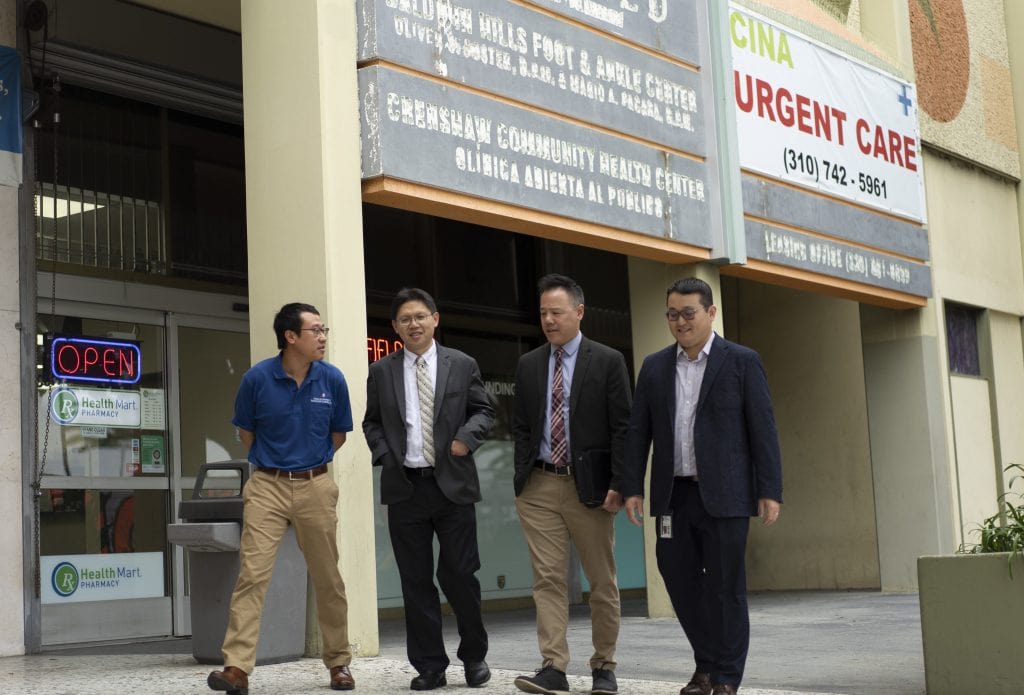The USC School of Pharmacy has received a $3 million contract from the Los Angeles County Department of Public Health to support its leadership of the California Right Meds Collaborative (CRMC), a consortium of health plans, pharmacies, and academic and professional organizations working to improve continuity of care through Comprehensive Medication Management (CMM). The CRMC collaborative seeks to engage patients as partners with pharmacists and physicians, to ensure that vital medications are selected, monitored, and taken to optimize results and minimize side effects.
“Our mission is to reduce the burden of chronic disease by advancing the role of pharmacists in the healthcare system.”
“Our mission is to reduce the burden of chronic disease by advancing the role of pharmacists in the healthcare system, thus increasing the number of adults in Los Angeles County with access to high quality health services and community resources for chronic disease prevention and control,” says Steve Chen, associate dean for clinical affairs and USC principal investigator. He founded CRMC in 2018.
The five-year contract is funded by the Centers for Disease Control and Prevention (CDC) through the Los Angeles County Department of Public Health as part of a program promoting innovative approaches to stem the rising rates of diabetes, heart disease and stroke across the nation.
As part of the project, USC will train 50-75 Los Angeles-based pharmacists per year on how to initiate or advance CMM in clinic and community pharmacy settings. The goal is to strengthen and scale the use of CMM in communities burdened by high rates of uncontrolled chronic conditions such as diabetes and high blood pressure. To further leverage this effort, USC and fellow CRMC members will conduct rigorous evaluations so that CDC, other government organizations, healthcare payers, legislators, and others can learn from this work.
“USC is the preeminent school of pharmacy in Los Angeles County and they’ve been doing a wonderful job building out the California Right Meds Collaborative,” says Tony Kuo, MD, director of the Division of Chronic Disease and Injury Prevention at the Los Angeles County Department of Public Health. “CDC has a lot of interest in using this type of learning collaborative as a vehicle to increase critical mass of healthcare providers who can work with patients effectively in the community. This model could give people greater access to team-based healthcare.”
Costs of Poor Adherence
Nationally, poor adherence to prescription medications is reaching epidemic proportions, resulting in adverse health outcomes, avoidable hospitalizations and higher risk of death. In total, suboptimal use of medications incurs as much as $528.4 billion in avoidable medical spending each year.
More than half of all Americans have one or more chronic diseases — and for 90 percent of these patients, medications are the first line of treatment. Optimizing medication usage is a crucial step in transforming the healthcare system to improve care and reduce costs.
“We’re thinking of new ways to make everyone healthier.”
“We’re thinking of new ways to make everyone healthier,” says Alex Kang, director of Clinical Pharmacy for L.A. Care Health Plan, a CRMC partner that provides access to quality healthcare for Los Angeles County’s vulnerable and low-income communities. “This CDC contract has given us the opportunity to partner with the Los Angeles County Department of Public Health and the USC School of Pharmacy to leverage the availability and skills of trained community-based pharmacists offering CMM for our patients.”
Increasing the use of pharmacists as “care extenders” is a key part of the initiative. As fixtures in the community, they are uniquely positioned to provide care that is easily accessible to diverse populations. By developing supportive relationships that help people correctly and consistently take their medications, pharmacists also empower patients to take control of their own health.
“This is a tremendous opportunity for the USC School of Pharmacy to again demonstrate and evaluate a model of care that leverages the expertise of pharmacists to cost effectively improve health outcomes,” Dean Vassilios Papadopoulos says. “We appreciate the county and CDC’s support in allowing us to expand our work through this important project that promises to provide desperately needed Comprehensive Medication Management services to some of the most vulnerable members of our community.”
To learn more about the California Right Meds Collaborative, visit
http://calrightmeds.org.


